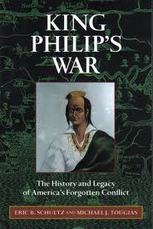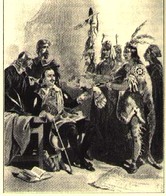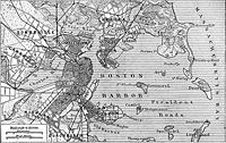King Philip's War (1675-76) - Part 1 of 2 Book by Eric B. Schultz Book by Eric B. Schultz Overview King Philip's War (1675-76) was the almost two-year conflict between the colonists and the Native Americans in New England that was considered to be one of the most devastating wars in this country's history. One in ten soldiers on both sides was either wounded or killed. At the height of the war, hostilities even threatened to push the English colonists back to the coast. In the aftermath of the war, it took years for towns to recover from the loss of life and property damage. The war is named for King Philip, the son of Massasoit and chief of the Wampanoag nation. After the death of his brother in 1662, whom the Indians suspected the English murdered, Philip became sachem. He maintained a shaky peace with the colonists for a number of years. However, peace eroded after the steady succession of land sales forced on the Indians and by their growing dependence on English goods.  Colonists and the Wampanoags Colonists and the Wampanoags By 1671, the English colonists grew suspicious of Philip and questioned him, fined him, and demanded that the Wampanoag surrender their arms. Following that indignation, a Christian Indian (who was an informant to the English) was murdered in 1675, probably at Philip's instigation. For that murder, three Wampanoag were tried and executed. These events led up to the official beginning of the war in June of 1675, where in retaliation to their tribesmen’s execution, the Wampanoag raided the border settlement of Swansea. Other Indian raids followed, where towns burned to the ground and many colonists were viciously slain.  1888 German map of Deer Island 1888 German map of Deer Island The Wampanoag were joined by the Nipmuc and Narragansett Indians, and soon all the New England colonies were involved in the war between colonists and “hostile Indians”. On the other hand, “Praying Indians” (Native Americans of New England who converted to Christianity) pledged loyalty to the colonists and provided invaluable service to the militias. Sadly, the great majority of these Praying Indians were persecuted due to distrust and misinformation. By March 1676, in the panic caused by heavy colonial losses, four hundred innocent Christian Indians were forcibly removed to Deer Island in Boston Harbor, where many died of hunger and exposure. The war declined after Philip’s unsuccessful attempt to secure aid from the Mohawk to the west. The consequence of the war, which was extremely costly to the colonists in both people and money, was the end of tribal Indian life in southern New England and the disappearance of the fur trade. Westward expansion of the colony would face virtually no resistance as the Indians no longer inhabited the frontier border lands or posed an imminent threat. NEXT WEEK - Part II: "How Did King Philip's War Play Out Locally?" SOURCES:
Allen, Rev. Joseph. History of Northborough, Mass., in Various Publications and Discourses. Worcester: 1880. Bigelow, Ella A. Historical Reminiscences of the Early Times in Marlborough, Massachusetts, and Prominent Events from 1860 to 1910: Including Brief Allusions to Many Individuals, and an Account of the Celebration of the Two Hundred and Fiftieth Anniversary of the Incorporation of the Town. Marlborough, Mass.: Times Publishing Company, 1910. Bodge, George Madison. Soldiers in King Philip's War; Being a Critical Account of That War, With a Concise History of the Indian Wars of New England from 1620-1677, Official Lists of the Soldiers of Massachusetts Colony Serving in Philip's war, and Sketches of the Principal Officers, Copies of Ancient Documents and Records Relating to the War, Also Lists of the Narragansett Grantees of the United Colonies, Massachusetts, Plymouth and Connecticut. Leominster, Mass.: Printed for the Author, 1896. Brigham, Willard Irving Tyler. The History of the Brigham Family: a Record of Several Thousand Descendants of Thomas Brigham the Emigrant, 1603-1653. New York: Grafton Press, 1907-1927. Commonwealth of Massachusetts. Worcester County. Deed Records, 1877. Worcester County Registry of Deeds, Worcester. Hudson, Charles. History of the Town of Marlborough, Middlesex County, Massachusetts: From its First Settlement in 1657 to 1861: With a Brief Sketch of the Town of Northborough, a Genealogy of the Families in Marlborough to 1800, and an Account of the Celebration of the Two Hundredth Anniversary of the Incorporation of the Town. Boston: T.R. Marvin & Son, 1862. Kent, Josiah Coleman. Northborough History. Newton, Massachusetts: Garden City Press, 1921. Schultz, Eric B. and Tougias, Michael J. King Philip's War: The History and Legacy of America's Forgotten Conflict. Woodstock, Vermont: The Countryman Press, 1999.
1 Comment
|
AuthorBeth Finch McCarthy
|

